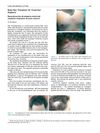 April 2023 in “The journal of investigative dermatology/Journal of investigative dermatology”
April 2023 in “The journal of investigative dermatology/Journal of investigative dermatology” The study suggests that changes in immune system receptors and their interaction with a cell component may be important in the development of a type of hair loss condition.
 9 citations,
January 2018 in “International Journal of Trichology”
9 citations,
January 2018 in “International Journal of Trichology” A woman's hair loss from graft versus host disease helps understand similar hair loss conditions.
54 citations,
September 2012 in “The journal of investigative dermatology/Journal of investigative dermatology” Vitamin A affects hair loss and immune response in alopecia areata.
[object Object] 1 citations,
January 2018 in “Skin appendage disorders” The complement system might be involved in the development of alopecia areata and could lead to new treatments.
 12 citations,
June 2020 in “Dermatology and therapy”
12 citations,
June 2020 in “Dermatology and therapy” Platelet-Rich Plasma (PRP) can promote new hair growth and increase hair density, but its effectiveness varies depending on the type of hair loss.
 20 citations,
May 2016 in “Journal of Cutaneous Pathology”
20 citations,
May 2016 in “Journal of Cutaneous Pathology” Using CD123 to detect certain immune cells helps diagnose a type of hair loss condition.
 June 2024 in “British Journal of Dermatology”
June 2024 in “British Journal of Dermatology” Black women with CCCA are more likely to have uterine fibroids.
[object Object]  170 citations,
December 2009 in “Histopathology”
170 citations,
December 2009 in “Histopathology” The conclusion is that accurate diagnosis of different types of hair loss requires good teamwork between skin doctors and lab experts.
 62 citations,
June 2015 in “The Journal of Dermatology”
62 citations,
June 2015 in “The Journal of Dermatology” People with alopecia areata have more Th17 cells and fewer Treg cells, which may be key to the condition's development.
 November 2012 in “South African Family Practice”
November 2012 in “South African Family Practice” The article concludes that early treatment of alopecia is crucial to prevent permanent hair loss.
 60 citations,
April 2018 in “Clinical, cosmetic and investigational dermatology”
60 citations,
April 2018 in “Clinical, cosmetic and investigational dermatology” Tight hairstyles and chemical relaxers can cause hair loss known as traction alopecia.
 1 citations,
October 2018 in “Madridge journal of dermatology & research”
1 citations,
October 2018 in “Madridge journal of dermatology & research” A young child with alopecia areata and psoriasis improved with treatment, suggesting a link between the two conditions.
 November 2023 in “bioRxiv (Cold Spring Harbor Laboratory)”
November 2023 in “bioRxiv (Cold Spring Harbor Laboratory)” Disrupted cholesterol production impairs hair follicle stem cells, leading to hair loss.
 January 2012 in “Yearbook of Dermatology and Dermatologic Surgery”
January 2012 in “Yearbook of Dermatology and Dermatologic Surgery” Studying acne-related syndromes helps us understand acne causes and can lead to new treatments.
 5 citations,
September 2018 in “Acta histochemica”
5 citations,
September 2018 in “Acta histochemica” The mTOR pathway proteins are altered in the hair follicles of patients with Lichen Planopilaris and Frontal Fibrosing Alopecia.
 122 citations,
November 2010 in “Journal of Dermatological Science”
122 citations,
November 2010 in “Journal of Dermatological Science” Male pattern baldness involves hormones and cell signals affecting hair growth.
 5 citations,
March 2012 in “Actas Dermo-Sifiliográficas”
5 citations,
March 2012 in “Actas Dermo-Sifiliográficas” Body-hair transplant successfully improved scarred areas and frontal hair density without visible chest scarring.
 3 citations,
May 2023 in “Precision clinical medicine”
3 citations,
May 2023 in “Precision clinical medicine” Researchers found four genes that could help diagnose severe alopecia areata early.
 2 citations,
February 2014 in “Hair therapy & transplantation”
2 citations,
February 2014 in “Hair therapy & transplantation” Alopecia Areata is an autoimmune condition causing hair loss, influenced by genetics, environment, and possibly improved by anti-MIF therapy, with many patients experiencing regrowth within a year.
 23 citations,
December 2015 in “Anais Brasileiros de Dermatologia”
23 citations,
December 2015 in “Anais Brasileiros de Dermatologia” Permanent hair loss after bone marrow transplant can be caused by chemotherapy or chronic graft-versus-host disease.
 16 citations,
May 2017 in “American Journal of Clinical Dermatology”
16 citations,
May 2017 in “American Journal of Clinical Dermatology” The document concludes that more research is needed to understand and treat Beard Alopecia Areata due to limited current knowledge and evidence.
 30 citations,
October 2013 in “Lupus”
30 citations,
October 2013 in “Lupus” Hair loss in lupus is different from hair loss in alopecia areata and may indicate lupus activity.
 8 citations,
August 2014 in “Clinical and Experimental Dermatology”
8 citations,
August 2014 in “Clinical and Experimental Dermatology” CTE and FPHL are different hair loss types with unique causes.
December 2022 in “Frontiers in Microbiology” The scalp microbiome is more diverse and may be more important in hair loss than the gut microbiome.
 19 citations,
June 2009 in “Seminars in cutaneous medicine and surgery”
19 citations,
June 2009 in “Seminars in cutaneous medicine and surgery” Proper education can prevent traction alopecia in women of color.
 September 2023 in “JEADV Clinical Practice”
September 2023 in “JEADV Clinical Practice” People with common hair loss conditions may have a higher risk of heart disease and related health issues.
 December 2023 in “Journal of General Procedural Dermatology and Venereology Indonesia”
December 2023 in “Journal of General Procedural Dermatology and Venereology Indonesia” A 61-year-old Filipino man had a skin condition that looked like another disease, making diagnosis difficult.

Minoxidil and finasteride are the only FDA-approved treatments for hair loss caused by genetic and hormonal factors, but their effectiveness is often doubted, indicating a need for new treatments.
 19 citations,
November 2010 in “PubMed”
19 citations,
November 2010 in “PubMed” New genetic insights have improved understanding of hair loss, leading to a new test and treatments, but more research is needed on the test and laser comb effectiveness.
 January 2025 in “Journal of the Egyptian Womenʼs Dermatologic Society”
January 2025 in “Journal of the Egyptian Womenʼs Dermatologic Society” Higher substance P levels may cause discomfort in hair loss patients.


























